9/11

Image via nito/Shutterstock.com
Our nation and the post-colonial world is facing a critical moment. We must face the diagnosis rising from the colonized. We must accept the reality that we are ill. We have been living according to false narratives and led by spiritual lies. And those lies have shaped and ordered life among us since our founding days.
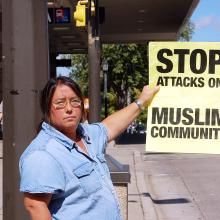
Image via miker/Shutterstock.com
"When we allow one faith community to be targets then we open the doors for others to be targeted. I believe the worst is yet to come unless more people actively intervene with their voices, their votes, and in public acts of solidarity with their Muslim neighbors."
Whoever set fire to a portion of the Islamic Center of Fort Pierce, Fla. has “terrorized our community,” a spokesman said, but the mosque will be reused as soon as possible.
The blaze at the facility — where Orlando Pulse nightclub mass shooter Omar Mateen used to worship — started at 12:40 a.m. Sept. 12. The cause is under investigation, fire officials said.
A video shows a person approaching the east side of the building just before a flash appears and fire breaks out, according to the St. Lucie County Sheriff’s Office.
In August 2016, as the 15th anniversary of the 9/11 attacks loomed, religious leaders tuned into a webinar to prepare themselves for a possible future disaster.
“Who was the first official casualty of 9/11?” asked Monsignor Stephen Rossetti, a Catholic priest and psychologist who led the webinar on “Shepherding in Tragic Times.”
“Father Mychal Judge,” he said, answering his own question, and referring to the priest who was fatally injured while ministering amid the chaos of the North Tower lobby.
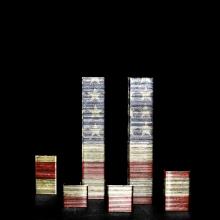
Image via Simone Fortuna/Shutterstock.com
Of course, those places were disappearing even when I lived there — that’s part of the charm of New York City, things come and go. In the city that’s very name has been changed to stay current, old things are constantly made new.
But it never became less jarring to note the Twin Towers’ absence on the horizon.
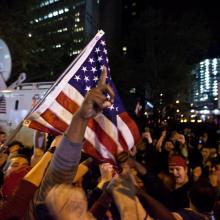
Image via MarineCorps NewYork / flickr.com
On first thought, cheering someone’s death sounds vile. But if I’m honest, I’ve never been so gripped by the sentiment of patriotism as on the day that I sat around a table with more than a dozen men, only one of whom — besides myself — was American. This was the day that President Obama announced that Osama bin Laden had been killed.
This week's Wrap was guest curated by Sojourners contributor Adam Ericksen. Read along for his top stories and notes from the week!
There was a lot of negativity in the news this week, but mercy also filled the airwaves. In case you missed it, here’s a list of some merciful events from the week:
1. Pope Francis Opens the Door to ‘Year of Mercy’ in a Time of Fear
Sure, we have some differences, but we’re still crushing on the Pope. “To pass through the holy door means to rediscover the infinite mercy of the Father who welcomes everyone and goes out personally to encounter each of them.”
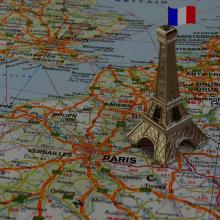
Image via yuri4u80/Shutterstock.com
Just like you, I was horrified when I learned of the terror attacks in Paris on Nov. 13. The scale, precision, and barbarity of these crimes are hard to fathom.
My first reaction was sadness for the victims and a desire for peace. My second was a sense of mild panic. If they can do this in Paris, they can certainly do it in my city!
My third reaction, one I’m not particularly proud of: I thought about how much I’d like to see the people responsible for these acts hunted down and destroyed.
I’ve been thinking a lot about 9/11 lately. I remember the way that we as a nation went through a similar three-step process. We went from shock and sympathy to fear and paranoia, and finally to the conviction that we must annihilate those who attacked us.
It all happened so quickly.

Image via Frontpage / Shutterstock
Our class studying terrorism found itself under terrorist attack.
You might expect these military men would be first in line calling for the use of force. You would be wrong. Veterans of the first Iraq war, they, like Gen. Colin Powell, warned that starting a war would be easy, but accomplishing anything good by the use of force in the region would be hard. Military attacks would "rearrange the rubble" and incite retribution and further cycles of violence. They urged other responses — political engagement, diplomacy, [and] legal and financial instruments.
As advisors to the U.S. Catholic Bishops, we also urged using “just peace” methods. Pope — now Saint — John Paul II urged President Bush not to invade Iraq but to pursue a just peace. The U.S. invasion would de-stabilize the entire region, cause worse bloodshed, and do more harm than good.
Today, as then, the military and religious leaders agree. We ought to notice.
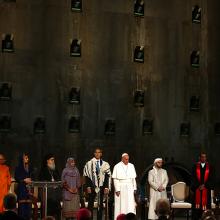
Cardinal Timothy Dolan, far right, speaks as Pope Francis stands with Jewish and Muslim leaders as he visits the museum to the September 11, 2001 attacks in New York, on September 25, 2015. Photo courtesy of REUTERS / Tony Gentile / RNS
Pope Francis embraced survivors of 9/11 in the footprints of the Twin Towers, then prayed for peace at an interfaith service beside the last column of steel salvaged from the fallen skyscrapers.
Arriving straight from his speech to the United Nations on Sept. 25, Francis met with 10 families from the 9/11 community — people who survived the destruction, rescued others from the inferno, or lost loved ones in the worst terrorist attack in U.S. history, executed by religious zealots.

Image via Wollertz/Shutterstock
Some social and trauma theorists believe these issues are directly symptomatic of an undiffused, collective trauma around the event of 9/11 — exacerbated by our post-modern, technocratic society, in which our witness of one another is often relegated by social media personas and devices. The environment is controlled, protected, guarded — a false sense of security that instead perpetuates isolation and disconnection. This raises a question as to where, and whether, we are experiencing integrated and authentic community as we heal.
It is widely acknowledged that supportive and caring community is an absolutely necessity in trauma repair. To be sure, the answer is complex and dynamic. But perhaps on this day of remembrance, rather than re-enacting our dissociative narratives, we can attempt to reimagine and embrace courageously an authentic witness — to continue the work towards a restorative, integrative, and peaceful future.
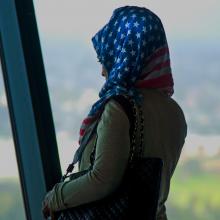
Image via ChameleonsEye/Shutterstock
If our nation is to remember the lives of all who have suffered because of 9/11, Christians will need to do their part to renegotiate the terms for who and what we remember. Otherwise, “never forget” will remain a well-intended but shallow slogan that encourages us to elevate some lives above others, and to turn a blind eye to the violence, injustice, and hatred directed at Muslims in our name.
If our nation is to remember the lives of all who have suffered because of 9/11, Christians will need to do their part to renegotiate the terms for who and what we remember. Otherwise, “never forget” will remain a well-intended but shallow slogan that encourages us to elevate some lives above others, and to turn a blind eye to the violence, injustice, and hatred directed at Muslims in our name.
CLINT EASTWOOD has made films about the sorrow and repeating pointlessness of war, as seen through the eyes of both aggressor and aggressed-against, with empathic performances and unbearably moving impact. His American Sniper, about the most lethal sniper in U.S. military history, bloodied in Iraq and struggling at home, is not one of those films. At best it’s a valuable character study of a confused warrior, revealing the traumatic effect of his service. At worst it’s a jingoistic and xenophobic attempt to put varnish on a terrible national response to the horror of 9/11, a response that became a self-inflicted wound creating untold collateral damage.
A decade ago, Eastwood made Flags of Our Fathers and Letters from Iwo Jima, which saw World War II soldiers as propaganda fodder and had the moral imagination to show both sides as courageous and broken without denying the difference between attacker and defender. These films are respectful and thoughtful, but American Sniper is arguably a work born in vengeance. Its reception (becoming one of the biggest January box office weekends ever, and a quick right-wing favorite) is part of the failure to deal in an integrated way with the wounds of 9/11, or to even begin to face the reality of the war in Iraq: an imperial conquest using the cover of national trauma as a justification
THERE'S NO BETTER sequel to the Senate Select Intelligence Committee’s executive summary of the torture report than Mohamedou Ould Slahi’s newly published Guantánamo Diary. This harrowing tale is only one of what someday will be many direct accounts by victims.
Originally from Mauritania, Slahi, 44, was detained on a journey home in January 2000 and questioned about the so-called Millennium plot to bomb the Los Angeles airport. Slahi admitted that he’d fought against Afghanistan’s communist government with the Mujahideen, at that time supported by the U.S. But he never opposed the United States. Authorities released him. A year and a half later, the young engineer was again detained and again released.
Months later, Slahi drove himself to a local police station to answer questions. This time, Americans forced him onto a CIA plane bound for Jordan, where he claims he was tortured. On Aug. 5, 2002, Americans brought him to Guantánamo. Slahi is among the detainees whose horrific torture there is the centerpiece of the Senate report. None other than then-Secretary of Defense Donald Rumsfeld signed the “special interrogation plan” authorizing his brutal ordeal.
Leaders of a Greek Orthodox church that was destroyed during the 9/11 attacks on the World Trade Center broke ground on a new St. Nicholas Greek Orthodox Church that will overlook the 9/11 Memorial.
The new domed building is scheduled to open in 2016, the same year as the church’s 100th anniversary. The church has raised $7 million of about $38 million needed.
Plans to rebuild the church were stalled by a dispute with the Port Authority of New York, which is in charge of overall rebuilding efforts at Ground Zero. Under an 2011 agreement brokered by New York Gov. Andrew Cuomo, the church agreed to drop its lawsuit in return for building at a larger site.
On Oct. 18, government and church leaders joined on a concrete platform surrounded by steel foundation beams and orange construction netting to break ground for the church, designed by renowned Spanish architect Santiago Calatrava.
Patrick J. Foye, who was named earlier this year as executive director of the Port Authority, said the future building would be “an iconic house of worship,” comparable to the building of St. Patrick’s Cathedral in midtown.
As a native New Yorker, I can never forget Tuesday, September 11, 2001. I was in college, but heading to my part-time job that morning. My car was being fixed, so my father drove me to work. There was an unusual amount of traffic and as we turned on the radio, we heard a reporter talk about a plane that hit the World Trade Center.
The first thought we had was that this was an accident. It had to be an accident, right? As we listened to the reports though, the second plane hit and it was clear that something was very, horribly, terrifyingly wrong.
From our office in Queens, we watched the towers burn and then collapse. The image of the great cloud of smoke and debris encompassing the skyline has been burned on my brain. And a few days later, while handing out sandwiches to mourners at the makeshift memorial at Union Square with my parents’ church and non-profit organization, the feeling of hugging a total stranger while she wept on my shoulder will never leave me.
It is impossible to forget.
I must admit the timeliness on the part of HBO to air the season finale of The Leftovers in the week of 9/11. Tom Perotta, who authored the play on which the show is based, purposely included allusions to 9/11. Rather than a theological treatise on the Rapture, it is a beautiful case study in grief and the excruciating tension between the desire to move forward and the need to remember.
That was a bumper sticker Sojourners published at the outset of the Iraq war more than a decade ago. American church leaders had not only opposed the war but offered an alternative: "An Alternative to War for Defeating Saddam Hussein, A Religious Initiative." We not only presented it to Colin Powell’s personal council and Tony Blair, but also printed full-page ads in every major British newspaper the day before their Parliamentary debate and vote on the war. The U.K.’s Secretary of State for International Affairs, Clair Short, told me the only real alternative on the table in their Cabinet meetings was “The American church leaders’ plan,” which, she said, was seriously discussed. U.S. and U.K. leaders showed they were drawn to an alternative plan to war that would remove any weapons of mass destruction that Saddam Hussein might have had (which he did not) and even to ultimately remove him from power but without going to war. Pope John Paul II was also opposed to the potential war. Both the Vatican and the American church leaders warned that the potential costs of a war in Iraq could include increasing the scope and threats of international terrorism. ISIS is that sad prophecy come true; the habit of war prevailed.
I have always believed that any alternative to war must still address the very real problems at hand — just in a more effective way. To say that “war is not the answer” is not only a moral statement but also is a serious critique of what doesn’t work; wars often fail to solve the problems and ultimately make them worse. War has to answer to metrics, just as more peaceful alternatives do. The war in Iraq was a complete failure with enormous human and financial costs; ISIS is now one of the consequences.
It’s been 14 years since our government declared war on terrorism. How are we doing? It feels like a disastrous game of Whack-A-Terrorist, doesn’t it? We kill one terrorist hiding in one hole, and out pops another one from another hole. Now we are facing the newest threat, a terrorist organization seeking to set up a nation-state, ISIS or IS, as its leadership prefers to be called. The Islamic State, at least, would be a concrete opponent. If they hold on to territory and establish a functioning government, we could at least declare war on a tangible target. Though regrettable it would at least make sense within the logic of war in which states fight other states.
In a recent article for Patheos.com, David French uses Christian Scripture as a justification for “responding to ISIS with wrath and vengeance.” French is a lawyer, a captain in the U.S. Army Reserve and senior counsel at the American Center for Law and Justice. He claims that, according to the Apostle Paul’s letter to the Romans, while individuals are called upon to love their enemies, there is no such call placed on governments. In fact, God has instituted governmental authority in order to execute his wrath against evildoers. And apparently, or so Romans 13 puts it according to French, to know who the evildoers are one simply needs to look at who governments are punishing. French quotes the relevant passage, Romans 13:3-5:
For rulers hold no terror for those who do right, but for those who do wrong. Do you want to be free from fear of the one in authority? Then do what is right and you will be commended. For the one in authority is God’s servant for your good. But if you do wrong, be afraid, for rulers do not bear the sword for no reason. They are God’s servants, agents of wrath to bring punishment on the wrongdoer. [Emphasis added by French.]
French concludes that American Christians should have no difficulty determining the correct response to ISIS. Why? By the fact of determining that justice must be executed against ISIS, our government has determined that their violence is not only an offense against American citizens (he names the beheading victims, journalists James Foley and Steven Sotloff) but against God himself.
French’s analysis strains credulity. Doesn’t he realize that the Romans to whom Paul was writing were themselves victims of government persecution? Does he think that these persecuted Christians felt they were being justly punished? And what about Paul himself, a Roman citizen who was persecuted and executed by the Roman government? Doesn’t French realize that by his own argument, the Roman authorities were executing God’s judgment against Paul? And by his own analysis, French is a captain in a military force that is from its origins a justifiable target for God’s wrath. Why? Because the founding act of the United States was a rebellion against a government, and “whoever resists authority resists what God has appointed, and those who resist will incur judgment.” (Romans 13:2)
On May 21, the National September 11 Memorial and Museum in New York is scheduled to release “The Rise of Al Qaeda,” a seven-minute film telling the story of the attacks. Full disclosure: I have not watched the film.
Here’s why the 9/11 museum should drop these terms from the film.
We clearly live in a world that is filled with risks and dangers, and because the increased availability of modern technology allows for harm to occur at unprecedented rates and levels, one can argue that we live in one of the most treacherous eras of human history. However, while the need for protection from harm is both natural and commendable, we are forced to consider whether protection itself can eventually become harmful, unnatural, and even condemnable. In other words, with such extensive resources invested in the pursuit of safety and security, one is forced to consider: What are the consequences of such “protection?" And what happens when so much time and effort is dedicated toward protecting ourselves from our neighbors that we eventually lose sight of who are neighbors actually are? At what point does the heightened priority of protection lead to the increased inevitability of isolation and ignorance? And finally, in our efforts to build impenetrable walls of protection (often in the name of freedom), do we not eventually incarcerate ourselves from the rest of the world and thus limit what it actually means to live free?









